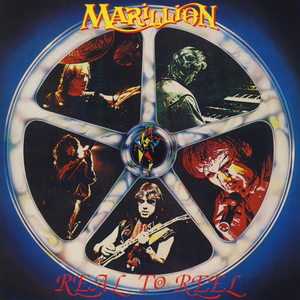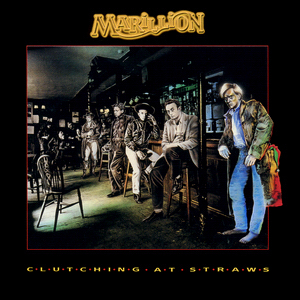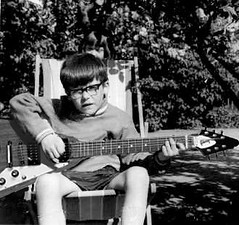Saturday, June 28, 2008
MARILLION
The question is not why didn't Marillion reach international superstardom; but how did they manage to achieve the success they briefly enjoyed?
By 1980 Prog Rock was not only dead, it was a joke. Yes, Genesis, and ELP had degenerated into veritable crap machines. It could be argued that ELP had never been anything but a veritable crap machine. Only those bands who were only loosely associated with Prog - Pink Floyd, Rush - remained vital. Even the mighty Floyd was beginning to fragment.
So what then, were Marillion thinking in 1979 when they embarked upon an insane journey based on the notion that what the kids really wanted was another Prog band.
Okay, maybe there was a more noble motive, maybe they just decided to play what they felt instead of what was popular. Steve Harris, bassist, band leader, and main composer for Iron Maiden, who was also a big supporter and fan of Marillion, had done the same thing in 1977 when Punk was king and Metal was deemed to have passed on. He fought through the fad, and found a fan base who were indeed waiting for a band just like Iron Maiden to come around.
Most of England's music fans in the early 1980's were thought to have abandoned long hair and technical proficiency in favor of safety pins and synthesizers, and it's certain a great many had, but there were still masses of punters who had not thrown out their Uriah Heep and King Crimson records. This demographic became the Maiden fan base, and in turn, oddly enough, many of them became Marillion fans as well.
The one thing, if there has to be only one, that Marillion did do right, in their initial incarnation at least, was match the flighty self indulgent side of Prog with Big Guitar Riffs. Like King Crimson but without the upper class arty vibe, and much less math. Pink Floyd was an obvious influence on Marillion, searing but lyrical guitar melodies fattened by keyboards and carried along by a powerful rhythm section that chose sympathetic support over bombast.
The vocals, however, were unapologetically Gabriel. I remember reading in Kerrang - again, since Prog was dead and everybody knew it, Marrillion was adopted by the Metal scene like musical orphans - anyway, in an interview in Kerrang, Fish (vocals) was asked about his influences. He refused to answer the question directly, quipping that it should be obvious.
It was.
Fish was no where near the caliber of a singer like Gabriel, much like Stephen Rothery (guitar) was certainly no Dave Gilmour, but, they were very good students. They took the elements of those outstanding performers that they could emulate and concentrated on that.
Fish is a poet who found that Rock was a more than suitable medium in which to work. On the surface Fish was an unlikely Rock Star. A pot-bellied giant who's hairline was quickly receding, Fish got by on an endearing earnestness and a working class ethos in his approach to the traditionally upper class of poetry and Prog Rock. Much like his contemporary Bono, Fish wore his heart on his sleeve without apology, as a badge of honor. Bono did not become cool, cool became Bono. I'm not sure cool ever became Fish, but that was the path he took.
A lot like a Marillion song, this post has already gotten long and I'm just starting to roll.
Formed in 1979 as Silmarillion after the Tolkein book, Marillion proper took shape in 1981 consisting of Fish, Steve Rothery, Pete Trewavas (bass), Mark Kelly (keys), and Mick Pointer (drums). A television appearance led to a record deal with EMI, and in 1982 the 'Market Square Heroes' single was released.
"I got a golden handshake that nearly broke my arm
I left the ranks of shuffling graveyard people
I got rust upon my hands from the padlocked factory gates
Silent chimneys provide the silent steeples
Cause I'm a Market Square hero gathering the storms to troop
Cause I'm a Market Square hero speeding the beat of the street pulse
Are you following me, are you following me?
Well suffer my pretty children and follow me, follow me"
Whereas the lyrical content of their Prog forefathers was generally high minded hogwash and never really seemed to be about anything, or at least anything that anyone could understand, Fish adapted a anti-establishment vibe akin to Punk bands like The Clash or The Jam to the obligatory overstated prose that in part defines Prog rock.
I was 16 at the time, and the heartbreak that Fish painted on the title track was something I connected to very strongly. All the tracks on that album are strong compositions, albeit somewhat ineptly recorded, again, much like the first Iron Maiden record.
Lots of gigging ensued, including a stint opening for Rush on the east coast leg of their American tour.
The result, in my opinion, is exceptional. The band was not happy with the final product, but they stoically put their disappointment behind them and hit the road, again opening for Rush in America. As their star ascended, so did their budgets. The live show became increasingly more elaborate, more sophisticated lights, multi level stage set, and Fish's propensity for tapping into theatrics in the form of face paint and props.
The live show was captured on tape for a live record, 'Real to Reel', released in November 1984. Featuring selections from their previous releases, 'Real to Reel' also contained 'Cinderella Search', a previously unreleased track that ranks among the bands better compositions.
The band was poised on the brink of breaking big. They had, like U2, been focused on the American market, and the next record would be the bands make or break moment concerning that effort. What did they do? They gambled. They went in both directions. They delivered a record that was simultaneously more accessible, and musically more ambitious.
Massive touring followed, the album continued to sell, and everything was great as the band went back into the studio in 1986. Everything except that the band had begun to develop a strained relationship with Fish.
Another tour followed. I caught them at The Ritz in NYC. They were great, the crowd sang along to all the songs, and then, as Fish eluded to on stage that night, he quit the band at the end of the tour.
Thus marks the end of Marillion for Jackson. The band brought on a new singer and have been working steadily ever since. They've recorded many records post Fish, none of which I bought.
Fish has had a semi-successful solo career. I have one of his records. It sounds like him trying to recreate Marillion.
I know none of you care.
The question is not why didn't Marillion reach international superstardom; but how did they manage to achieve the success they briefly enjoyed?
By 1980 Prog Rock was not only dead, it was a joke. Yes, Genesis, and ELP had degenerated into veritable crap machines. It could be argued that ELP had never been anything but a veritable crap machine. Only those bands who were only loosely associated with Prog - Pink Floyd, Rush - remained vital. Even the mighty Floyd was beginning to fragment.
So what then, were Marillion thinking in 1979 when they embarked upon an insane journey based on the notion that what the kids really wanted was another Prog band.
Okay, maybe there was a more noble motive, maybe they just decided to play what they felt instead of what was popular. Steve Harris, bassist, band leader, and main composer for Iron Maiden, who was also a big supporter and fan of Marillion, had done the same thing in 1977 when Punk was king and Metal was deemed to have passed on. He fought through the fad, and found a fan base who were indeed waiting for a band just like Iron Maiden to come around.
Most of England's music fans in the early 1980's were thought to have abandoned long hair and technical proficiency in favor of safety pins and synthesizers, and it's certain a great many had, but there were still masses of punters who had not thrown out their Uriah Heep and King Crimson records. This demographic became the Maiden fan base, and in turn, oddly enough, many of them became Marillion fans as well.
The one thing, if there has to be only one, that Marillion did do right, in their initial incarnation at least, was match the flighty self indulgent side of Prog with Big Guitar Riffs. Like King Crimson but without the upper class arty vibe, and much less math. Pink Floyd was an obvious influence on Marillion, searing but lyrical guitar melodies fattened by keyboards and carried along by a powerful rhythm section that chose sympathetic support over bombast.
The vocals, however, were unapologetically Gabriel. I remember reading in Kerrang - again, since Prog was dead and everybody knew it, Marrillion was adopted by the Metal scene like musical orphans - anyway, in an interview in Kerrang, Fish (vocals) was asked about his influences. He refused to answer the question directly, quipping that it should be obvious.
It was.
Fish was no where near the caliber of a singer like Gabriel, much like Stephen Rothery (guitar) was certainly no Dave Gilmour, but, they were very good students. They took the elements of those outstanding performers that they could emulate and concentrated on that.
Fish is a poet who found that Rock was a more than suitable medium in which to work. On the surface Fish was an unlikely Rock Star. A pot-bellied giant who's hairline was quickly receding, Fish got by on an endearing earnestness and a working class ethos in his approach to the traditionally upper class of poetry and Prog Rock. Much like his contemporary Bono, Fish wore his heart on his sleeve without apology, as a badge of honor. Bono did not become cool, cool became Bono. I'm not sure cool ever became Fish, but that was the path he took.
A lot like a Marillion song, this post has already gotten long and I'm just starting to roll.
Formed in 1979 as Silmarillion after the Tolkein book, Marillion proper took shape in 1981 consisting of Fish, Steve Rothery, Pete Trewavas (bass), Mark Kelly (keys), and Mick Pointer (drums). A television appearance led to a record deal with EMI, and in 1982 the 'Market Square Heroes' single was released.
"I got a golden handshake that nearly broke my arm
I left the ranks of shuffling graveyard people
I got rust upon my hands from the padlocked factory gates
Silent chimneys provide the silent steeples
Cause I'm a Market Square hero gathering the storms to troop
Cause I'm a Market Square hero speeding the beat of the street pulse
Are you following me, are you following me?
Well suffer my pretty children and follow me, follow me"
Whereas the lyrical content of their Prog forefathers was generally high minded hogwash and never really seemed to be about anything, or at least anything that anyone could understand, Fish adapted a anti-establishment vibe akin to Punk bands like The Clash or The Jam to the obligatory overstated prose that in part defines Prog rock.

I was 16 at the time, and the heartbreak that Fish painted on the title track was something I connected to very strongly. All the tracks on that album are strong compositions, albeit somewhat ineptly recorded, again, much like the first Iron Maiden record.
Lots of gigging ensued, including a stint opening for Rush on the east coast leg of their American tour.

The result, in my opinion, is exceptional. The band was not happy with the final product, but they stoically put their disappointment behind them and hit the road, again opening for Rush in America. As their star ascended, so did their budgets. The live show became increasingly more elaborate, more sophisticated lights, multi level stage set, and Fish's propensity for tapping into theatrics in the form of face paint and props.

The live show was captured on tape for a live record, 'Real to Reel', released in November 1984. Featuring selections from their previous releases, 'Real to Reel' also contained 'Cinderella Search', a previously unreleased track that ranks among the bands better compositions.
The band was poised on the brink of breaking big. They had, like U2, been focused on the American market, and the next record would be the bands make or break moment concerning that effort. What did they do? They gambled. They went in both directions. They delivered a record that was simultaneously more accessible, and musically more ambitious.

June of 1985 saw the release of 'Misplaced Childhood', which hit all the marks of a serious Prog record, it was a concept piece with each side a continuous musical entity comprised of interwoven songs, two of which were released as singles: 'Kayleigh', and 'Lavender'. Remarkably 'Kayleigh' became a hit not only in the UK, but in the USA as well. I remember hearing it on the radio while working at the Montgomery Mall that fall. This was new for me, as the music I liked tended to be shunned by radio.
Massive touring followed, the album continued to sell, and everything was great as the band went back into the studio in 1986. Everything except that the band had begun to develop a strained relationship with Fish.

Another tour followed. I caught them at The Ritz in NYC. They were great, the crowd sang along to all the songs, and then, as Fish eluded to on stage that night, he quit the band at the end of the tour.
Thus marks the end of Marillion for Jackson. The band brought on a new singer and have been working steadily ever since. They've recorded many records post Fish, none of which I bought.
Fish has had a semi-successful solo career. I have one of his records. It sounds like him trying to recreate Marillion.
I know none of you care.
Comments:
Oh yes, I remember "Misplaced Childhod." Who can forget the opening line, "Huddled in the safety of a pseudo-silk kimono wearing bracelets of smoke; naked of understanding"?
I only know that record, but my impression was that they essentially ripped off the sound of "Duke" era" Genesis wholesale. Some of those keyboard lines are so close to Banks that it sounds like outright stealing. Not a bad sound, but all pretty silly.
They belong in the dustbin of history.
I only know that record, but my impression was that they essentially ripped off the sound of "Duke" era" Genesis wholesale. Some of those keyboard lines are so close to Banks that it sounds like outright stealing. Not a bad sound, but all pretty silly.
They belong in the dustbin of history.
I admit that I didn't know much about Marillion but "Kayleigh" is one of my favorite songs of the '80s. (The only other of their songs I knew was "Lavender.") I love when I mention to other people and they look at me like I just grew a third eye.
By the way, I saw your comment about Acquiesce on Tony Alva's blog, and now I see you're in Brooklyn. Do you know The Bogmen?
By the way, I saw your comment about Acquiesce on Tony Alva's blog, and now I see you're in Brooklyn. Do you know The Bogmen?
Well, I think I've met that Dan dude a time or two. Acquiesce has played with The Bogmen and The Knockout Drops before, and I think they're all friends. A couple of the ex-Bog guys are doing a thing with Gordon Gano now that's pretty cool.
Was bearish on Mirillion as you remember, but still spin the Childhood record every now and again. Loved the tour ending show at The Chance Brian took me to after he'd gotten over them and had a blast.
Prog rock is just not my bag, but I can groove to it every now and again.
Post a Comment
Prog rock is just not my bag, but I can groove to it every now and again.

